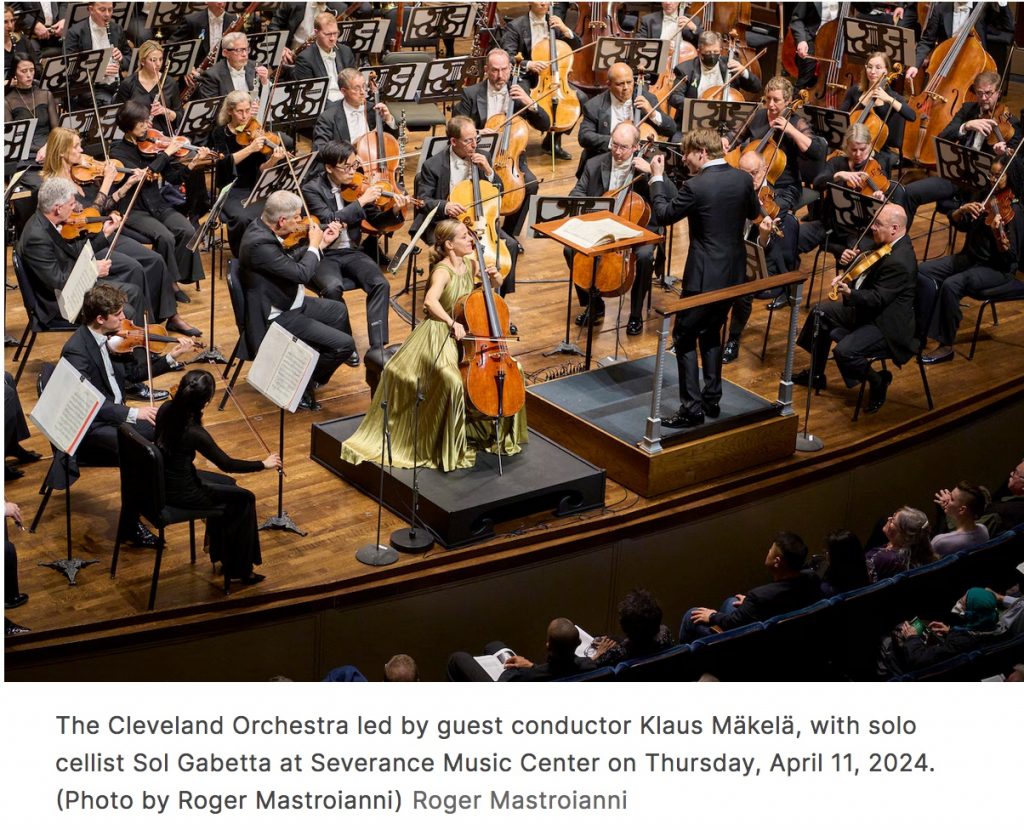
Originally published on Cleveland.com
CLEVELAND, Ohio — Music can transport you — not only emotionally, but physically — to another time and place.
Cleveland Orchestra fans who hopped on guest conductor Klaus Mäkelä’s magic carpet at Severance Music Center on Thursday evening were swept away to the streets of Lima to hear Peruvian street vendors hawking their goods, then to England for a ramble through the Malvern Hills, and finally to ancient Iraq to quaff wine with the king of Babylon and a thousand of his idol-worshiping lords. Although the evening didn’t turn out well for Belshazzar, Walton’s music raised the roof of Mandel Concert Hall by a yard or two with resplendent orchestral and choral sound.
Peruvian composer Jimmy López Bellido’s Perú negro looked like an outlier on the printed program but proved to be an exhilarating opener whose rhythmic vitality resonated with the final work of the evening. Commissioned by conductor and fellow Peruvian Miguel Harth-Bedoya for the centenary of the Fort Worth Symphony, the 15-minute piece encodes Harth-Bedoya’s name into the opening horn solo that turns into a brass fanfare and gives a nod to the music of Africans who were enslaved and taken to Peru by the Spaniards.
Full of dance rhythms and seasoned with more chromatic scales than a Verdi opera, the piece is kept vibrant by the percussion section, who add color by bringing a myriad of instruments into the mix — cajóns (resonant boxes), cowbells, ratchets, cabasa (steel ball chain wrapped around a wooden cylinder), jawbone (of an ass), mark tree, vibraslap, temple blocks and thunder sheet. Those players were rightfully signaled out for a stand-up.
Edward Elgar’s Cello Concerto brought together two soulmates: the outstanding Sol Gabetta, who was the actual soloist on Thursday, and Mäkelä, who also plays cello. The combination amounted to a kind of mind-meld that revealed the special character of Elgar’s 1918-1919 piece.
You might think that following Jacqueline du Pré in her iconic recording of this work would be a daunting prospect, but Gabetta had much to add to the tradition, drawing on a unique sound both grand and intimate.
Suffused with hopeful melancholy, the handsome opening movement was marked by a rich, full sound but a relaxed feeling. Well-shaped phrases were seamlessly passed from soloist to orchestra and back again, and Mäkelä allowed the final tutti to blossom.
The transition into the scherzo brought you to the edge of your seat for the duration of a movement whose quick, playful tempo never let up, and the third movement, where Gabetta achieved a focused, unblemished tone, was both intimate and passionate.
As the rest of the concerto unfolded, Gabetta sustained long, unwavering lines and, dancing on her bench, gave every indication that she was thoroughly enjoying herself. Mäkelä and the orchestra backed her up brilliantly, leaving you to wonder why this had to end.
End it did, but there was a consolation prize. Responding to a seismic ovation, Gabetta both played and vocalized exquisitely in an encore — Latvian composer Peteris Vasks’ Grāmata čellam.
The evening ended with William Walton’s flamboyant oratorio Belshazzar’s Feast, proving Oscar Wilde’s obiter dictum that “Moderation is a fatal thing. Nothing succeeds like excess.”
Responding to a BBC commission for a small-scale choral work, England’s bad boy composer of the decade following the Great War, who established his creds with Edith Sitwell’s Façade, took a story from the Hebrew Book of Daniel and fashioned a hyper-dramatic work so huge that it had to be moved to the Leeds Festival in 1931.
Every element in Thursday’s performance boasted star power: the commanding narration by baritone Thomas Hampson, the flawless and exuberant singing of the Cleveland Orchestra Chorus prepared by Lisa Wong, the dazzling playing of The Cleveland Orchestra from the opening brass fanfare to the stentorian closing bars undergirded by the deep bass notes of the organ, and not least, the tight and expert pacing by Klaus Mäkelä.
Belshazzar’s Feast is an embarrassment of musical riches, even when Walton sails a bit close to the wind. It was a thrill and a privilege to be in its midst on Thursday evening.
This program will be repeated on Saturday at Severance Music Center, 11001 Euclid Ave, Clevelan. Tickets, starting at $39 are available at clevelandorchestra.com. 8 p.m. Klaus Mäkelä, who has recently been named music director designate of the Chicago Symphony, returns next weekend to lead The Cleveland Orchestra in concerts featuring Stravinsky’s The Rite of Spring.
Published on ClevelandClassical.com April 15, 2024.
Click here for a printable copy of this article



